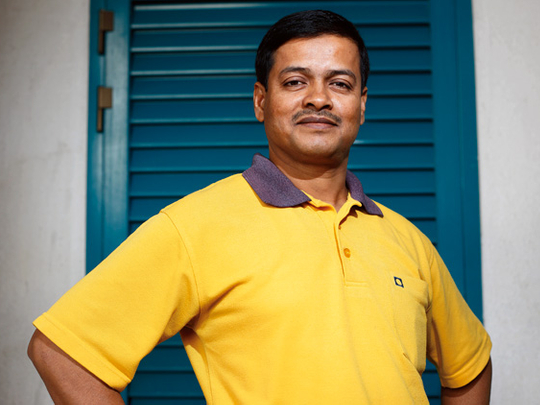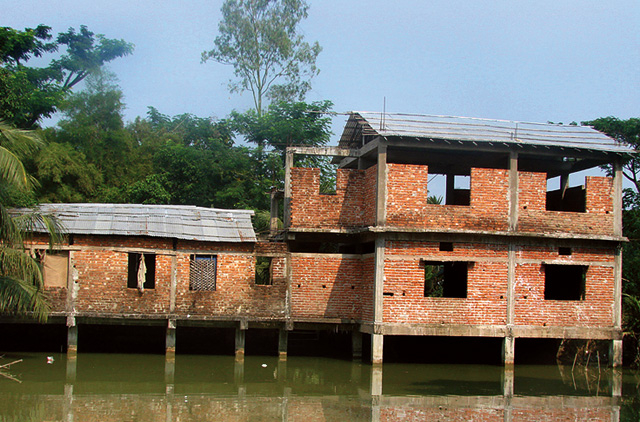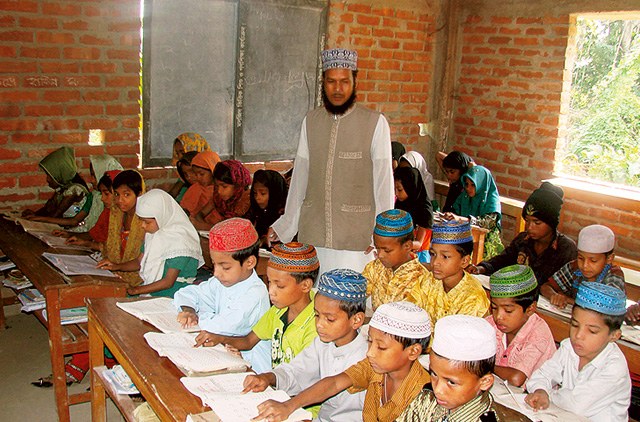
Abdul Mannan Jamaluddin glances at a small boy and girl, dressed in crisp white and red uniforms, bags bouncing as they rush towards the school bus waiting outside his building in Sharjah. He smiles as they jump aboard and the bus pulls away. "Maybe my school will be able to send a bus to pick up our children some day," he murmurs.
If any of the residents in the building where Abdul Mannan, 48, is a watchman, overheard him they'd be very surprised. Because their security guard, who cleans the building and puts out the rubbish, has been running a school in his native village, Belchura, in Bangladesh for the past six years. So far he's educated 200 children by donating most of his Dh1,200-a-month salary and with the help of just three friends who also send him money.
But Abdul Mannan - whose children Mohammad, ten, Maryam, eight, and Aisha, five, attend the school run by their father - doesn't want any thanks. He's simply happy to know the youngsters where he grew up are being given opportunities he never had.
"I wasn't able to continue my studies beyond high school as my father couldn't afford to educate us," he says. "That meant I only have the most basic education. I was 26 when I came to the UAE in 1989, and the only work I could get was as a watchman."
Abdul Mannan has been here ever since. "I've not been able to move on as I am not well educated," he says. "I didn't want the next generation to suffer my fate."
So during a trip home in 2001, he realised he couldn't stand by and watch children grow up without attending school. Even though he'd been gone over a decade the 40 families living in Belchura still didn't have anywhere to learn, or any teachers. "There was no school. There has been no development in Belchura. We've requested the government for schools, but nothing's happened. Every time I see children going to school in Sharjah, my thoughts turn to the children growing up in my village. I was determined to help them in some way."
‘I just got moving'
Abdul Mannan had his own family to care for and a small salary, but he didn't let that stand in the way. "I just had to do it,'' he says. "I knew I wouldn't have been able to set up the school if I stopped to think where the money would come from. I just got moving."
Miracles are wrought by determination, Abdul Mannan realised. When he spoke to one of the village elders about his plan, he very generously offered to donate a piece of land for the building. Abdul Mannan began work on it immediately. He managed to get together some local labourers and the school's basic structure was built in four months. As his holiday was coming to a close, he hurriedly started his school in the unfinished building. Although his wife did not approve (she was not sure whether he had saved up enough for their own children's future), Abdul Mannan was keen to realise his dream and began scouting for teachers in nearby villages. So, with just a couple of months to go before he returned to Sharjah, he and one teacher got the school up and running. Pleasantly surprised to see a school finally take shape, the villagers gladly began sending their children to lessons.
Seventy students attended Grade 1 classes and Abdul Mannan managed to appoint a few more teachers. "I was thrilled," he says. "I thought my dream had finally been realised."
Then, just a month later disaster struck. Abdul Mannan wasn't aware that the elder who'd donated the land hadn't consulted his family. A brother was furious that his permission hadn't been sought and had the building demolished.
"I thought that was it," Abdul Mannan recalls. He returned to the UAE, as his family and friends tut-tutted over his ‘immaturity'.
But Abdul Mannan wasn't ready to give up. "I had to do it, I couldn't fail," he says.
If at first you don't succeed...
It wasn't a question of ego. "I was not bothered about what people said," he says. "I had seen the eagerness with which the children came to school for those few days. We had given them a promise and I had to keep my word."
With all that he'd saved for the past five years reduced to dust, it took Abdul Mannan four more years of saving before he could get started on his dream project. "When I went home in 2005, I had a plan. I wanted to include the entire village in the scheme as I knew I couldn't pull it off without their cooperation."
His plan was ingenious. He knew very few people would be interested if he told them he wanted to start a school. For the villagers, who had to struggle for their daily bread, education was not the primary concern. Children meant more hands bringing in more income if they were made to work. Schools would put an end to that. To overcome any potential opposition he decided to invite them for a feast to announce a wedding.
"I knew they couldn't resist the idea of free food," chuckles Abdul Mannan. "And then there was the curiosity to know who was getting married - they all knew there was no one of marriageable age in my family!"
He did not even tell his wife, Sharmin Akhthar, what he was up to. "After all, she'd been opposed to the idea of putting money in the school right from the beginning," he says. After serving the villagers tea and snacks, Abdul outlined his plan to lift the children out of the mire they were in. "I also told them at the outset that I didn't expect them to contribute anything." He had bought a plot of land and told those assembled that he planned to build a school on it.
But he was pleasantly surprised when some of villagers offered whatever they could. One of them announced right there that he'd contribute a sack of cement towards construction. "It took about 80 sacks to make the first building, and 60 sacks were contributed by the villagers," says Abdul Mannan. This time most of the villagers pitched in, helping in whatever way they could as the building grew. By the time his vacation ended, the ground floor of the building was ready, and the first group of 70 students attended class at the school, Hazrat Abu Bakr Siddique (R) Sunni Madrasa. "It was an incredible feeling!" says Abdul Mannan.
The feeling was shared by the children in the village who could finally go to school. The detractors among the villagers finally started acknowledging Abdul Mannan's contribution. But he is modest. "I haven't done anything out of the way," he says. "My life has been the same, before and after. I've not had to scrimp and scrounge as God has been kind to me. My needs here in Sharjah are minimal, as I have a room in the building and my food and daily needs do not take up too much. I save most of what I earn."
Growing bigger and better
Since 2005, the school has been expanding by one grade every year. This January the first batch of students will enter Grade 7. The number of students has risen to 200, and the school employs eight teachers. "Two of them are from our village," says Abdul Mannan proudly.
All the children are taught free of charge. Even their books are supplied by the school.
It seems incredible that a watchman earning around Dh3,000 a month - Abdul Mannan supplements his salary by running errands for the tenants - can run a school as well as look after his family. "It's the will of God," he says simply. "We pay the teachers a salary of Taka25,000 (Dh1,190). I don't have much expenses here, and we have a cloth business in our village that pays for my family's upkeep. So, the money I earn here stretches to pay for the school's expenses."
His wife has been won over now, although she was initially worried about their family's future savings. But Abdul Mannan is sure it will all work out well. He is hands-on where the administration of the school is concerned. He keeps in touch every day over telephone with the teachers, and helps solve problems. "Anybody who has money to spare, donates towards the school fund," says Abdul Mannan. "There are three friends of mine from the village who are working abroad, who contribute around Taka10,000 (Dh480) every month."
Though the school has not yet been granted government aid, it receives free supplies of blackboards, chalk and dusters from the education department.
The school has not only made the future of the children in and around the village brighter, it has also given some youngsters gainful employment. Since parents of children from the outskirts of the village could not drop them off every day, Abdul Mannan bought five autorickshaws two years ago to ferry them to school. He donated the vehicles to unemployed youths who ply them as taxis. The children using the service pay Taka300 (Dh14) per month, which is the only expense incurred for their schooling. When he sees the children in Sharjah going by school bus, he's reminded of his own school where the rickshaws have to make many trips to get them to school. "That day (when we have our own bus) too shall come," he says.
The school building too has expanded over the years, adding a floor to the original one. "My dream is to expand it to the primary level (Grade 8), and then to the secondary level (Grade 12)," says Abdul Mannan. "I am certain by 2014 our school will start Grade 8 classes." And he plans to do it all by himself. "I don't ask for donations," he says. "I've not even asked the government for help. If it has to happen, it will. When I first started out I didn't know if it would last. Some of my neighbours gave it two years. Now they are as keen as me to see it grow."
What keeps him going is his own plight. "I am stuck in this job because I couldn't study," he says. "That shouldn't happen to any child from my village."
Making a difference
- Who: Abdul Mannan Jamaluddin
- What: Running a school for children of his village
- Where: Bechura, Bangladesh
- How: Saved money to build and operate the school by himself














